Modern patient engagement software
Provide your patients with the engagement they need for appointments, digital intake, and more.
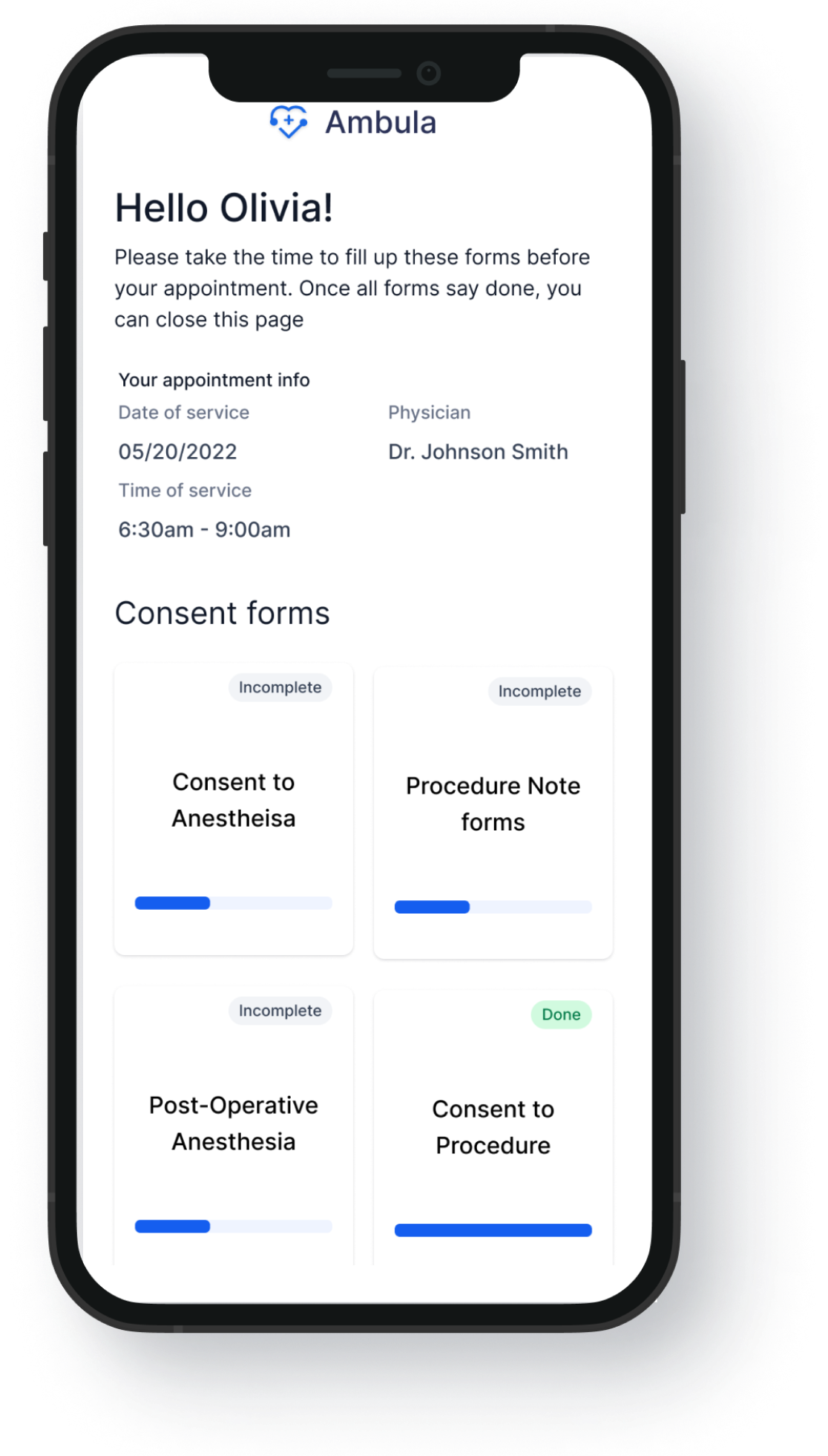
Engage with your patients like never before
There is a lot that goes into communicating with patients. Simplify it with Ambula’s patient engagement platform.
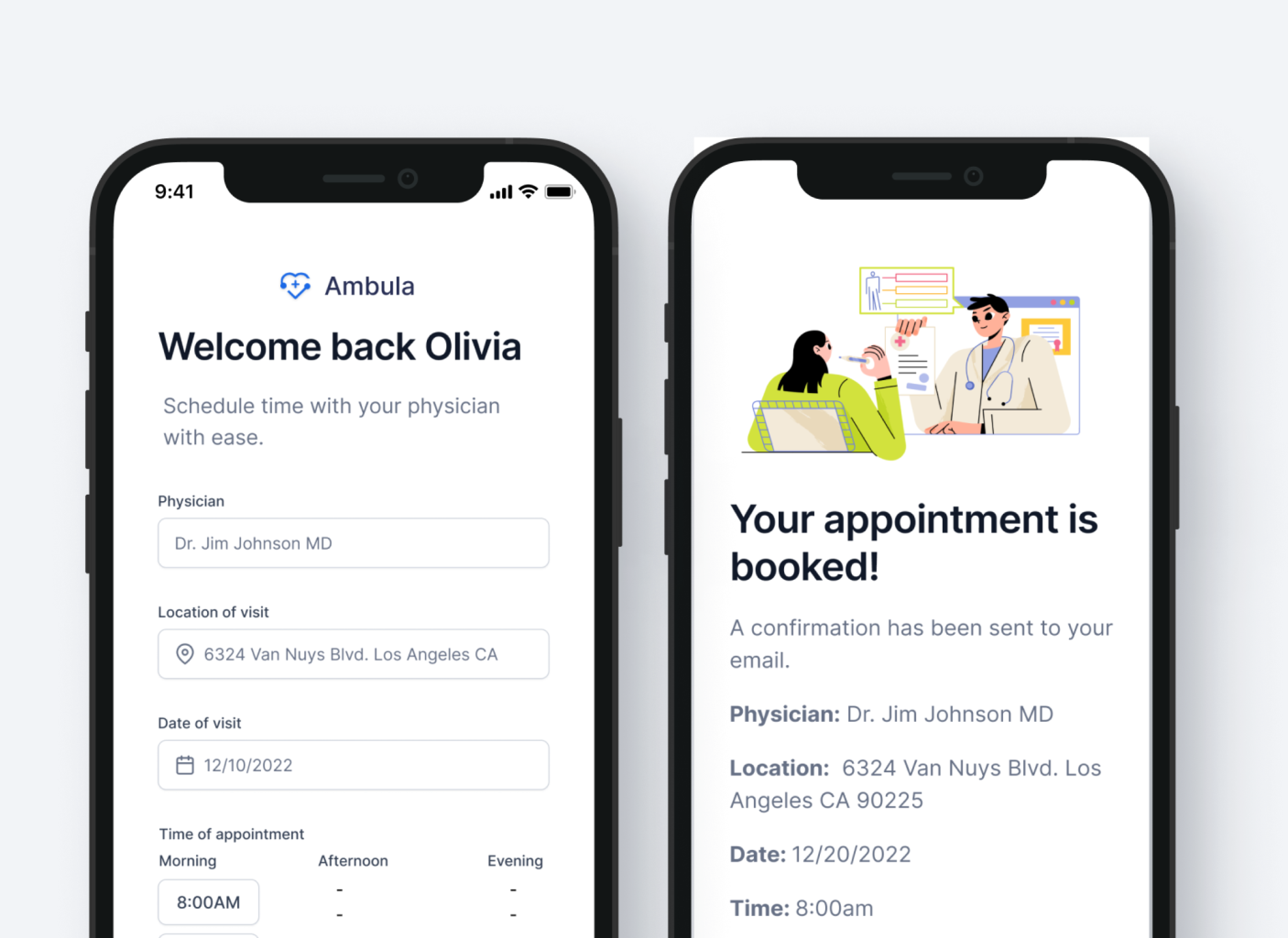
Online patient scheduling
Allow patients to schedule, reschedule, or cancel their appointments on their own. Manage availability, collect insurance, & more.
Boost your practice’s patient volume with easy self-serve scheduling
Reduce no-shows by allowing patients to manage their own visits.
Get a unique scheduling URL for your medical practice
Intuitive Digital Intake process
Ambula allows you to provide patients a digital intake experience that is easy and customizable
Create your own digital intake forms for patients to sign
- Customize consent forms & medical forms
- Allow patients to fill out forms at home before their visit
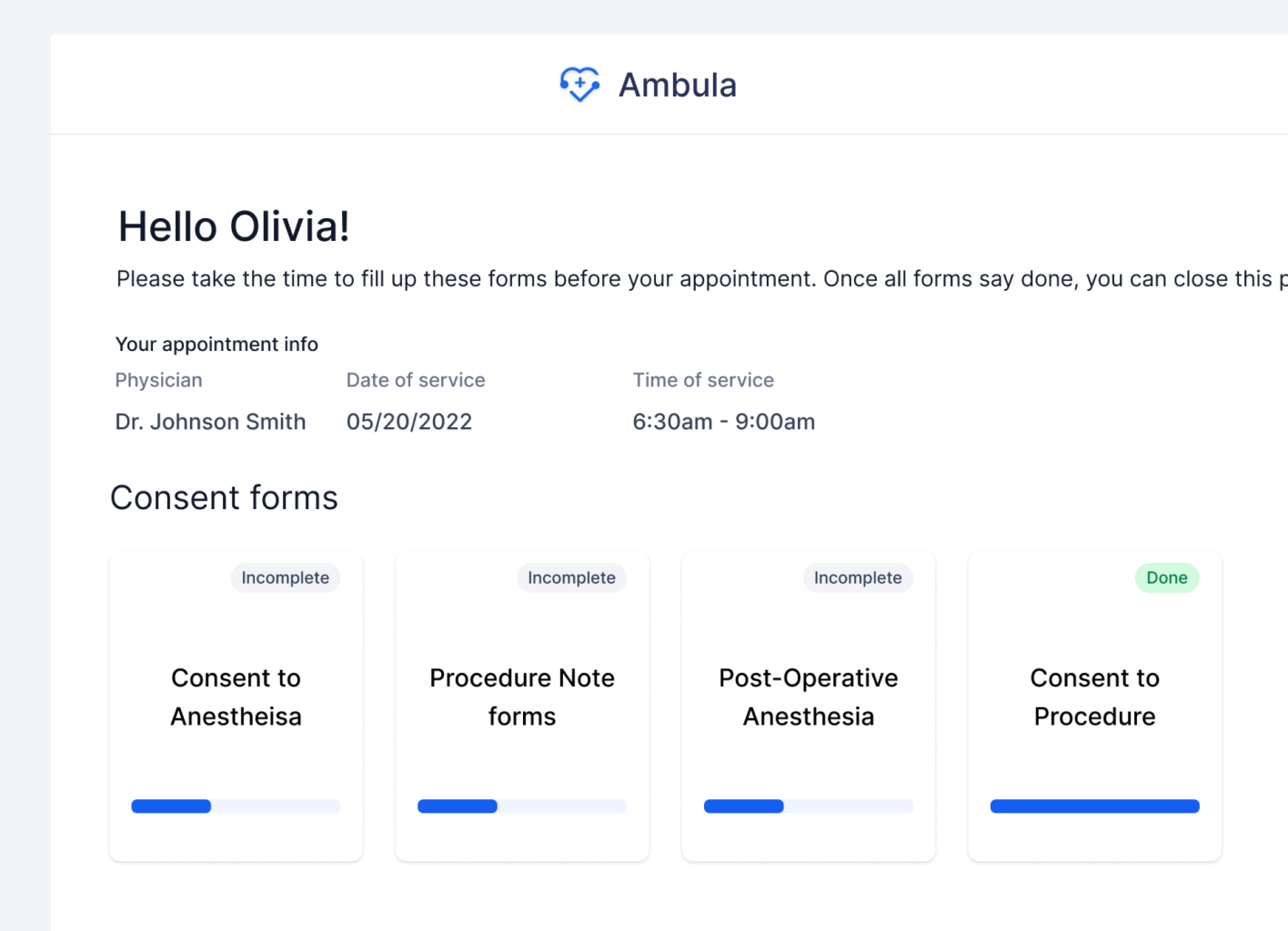
Grow with Ambula Health
-
Patient feedback provides a direct and authentic perspective on the patient experience, enabling healthcare providers to understand their strengths, weaknesses, and areas for improvement.
-
It allows healthcare organizations to measure patient satisfaction, identify areas of dissatisfaction, and take proactive measures to enhance the quality of care.
Patient education resources are an essential feature of patient engagement software that aims to empower patients with knowledge and information about their health conditions, treatments, and overall well-being.
This feature allows for seamless data exchange and ensures that all patient information is accessible in one place.
Reputation management in patient engagement software involves actively monitoring and managing your online presence, including reviews, ratings, and feedback from patients. By paying attention to what patients are saying about your practice, you can address concerns, highlight positive experiences, and actively engage with patients to build trust.

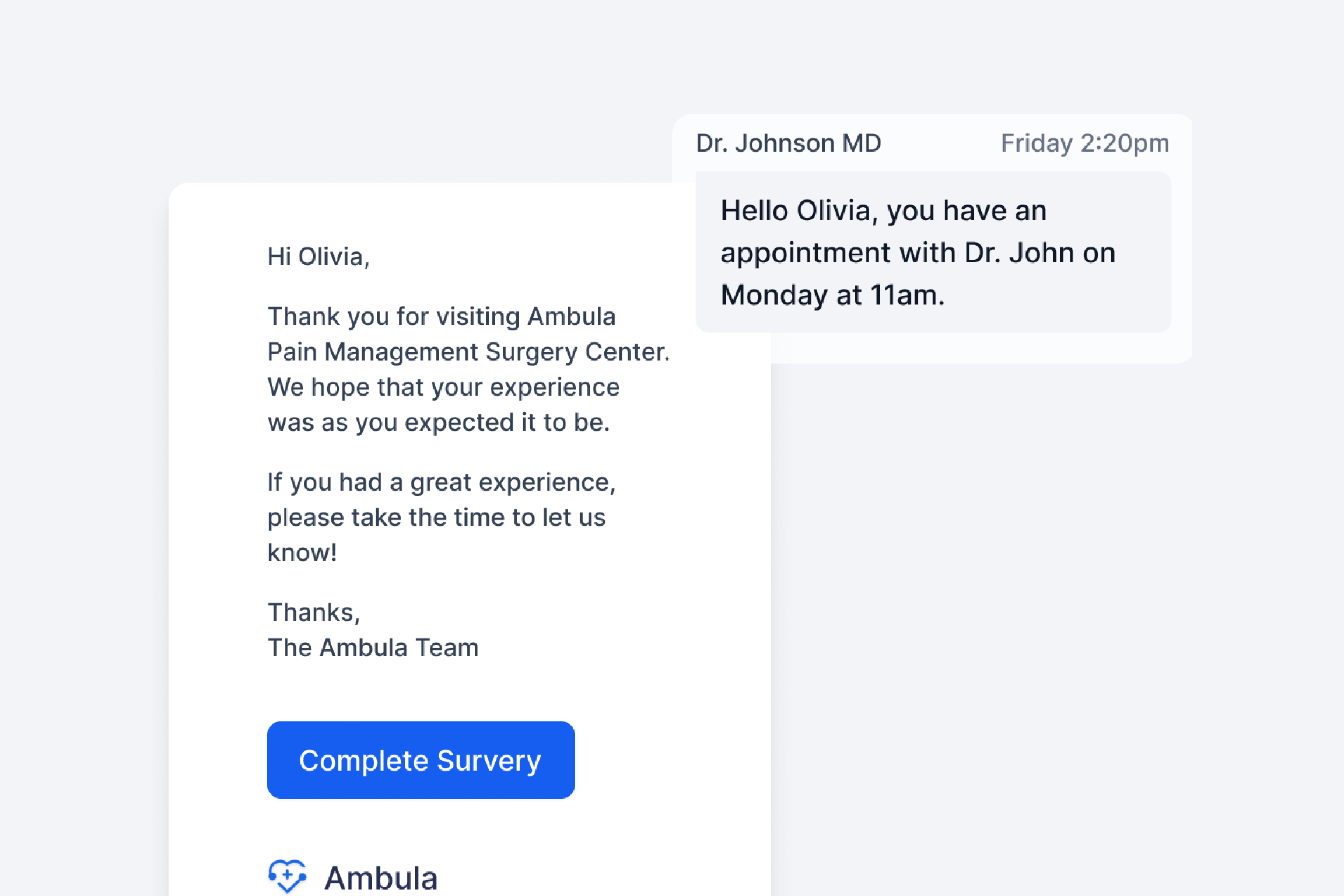
Patient Engagement Automation
Send automated appointment reminds and information to your patients before their visit.
Automated appointment reminders
- Automated reminders for patients to fill up their forms
- Send patient surveys to fill out after their visit
Patient engagement software for today’s era of healthcare
Ambula offers powerful self-serve tools that allow you to create your own EMR experience that integrated with your workflow
Customize your own charts with our form builder. Build consent forms, medical forms, surveys, preference cards, and more.

Create you own workflow that is personalized to your surgery center and practice.

Unleash the power of your data and generate a report on every piece of data you collect.

Allow patients to fill up their forms before their visit. Sync their forms straight to their chart.
Scheduling just got easier with automated reminders, physician calendar views, and more.
Reduce countless of hours faxing and emailing by syncing your ASC with the office in real time.
Ambula EMR software overview
Ambula allows you to provide patients with a digital intake experience that is easy and customizable
- Create your own digital patient intake forms for patients to sign
- Customize consent forms & medical forms
- Allow patients to fill out forms at home before their visit
The administrative side of a medical office often involves a multitude of tasks, such as managing patient information, scheduling appointments, handling paperwork, and coordinating with insurance providers. These tasks can be time-consuming, prone to errors, and can take away precious moments that could be spent providing care to your patients. That’s where patient engagement software comes to the rescue!
Traditionally, waiting rooms have been a necessary part of healthcare settings, where patients patiently wait for their turn to see the healthcare provider. However, with the advent of patient engagement software, the concept of waiting rooms has been revolutionized, giving rise to the concept of virtual waiting rooms.
We all know that running a medical practice involves providing excellent patient care and managing the business’s financial aspects. Thankfully, patient engagement software is here to simplify and optimize your practice’s revenue generation and financial management processes. By increasing efficiency, reducing costs, and enhancing marketing, patient engagement solution can help doctors to attract new patients, retain existing patients, and improve patient outcomes.
Appointment reminders are a valuable feature of ambula patient engagement software that helps healthcare providers and patients stay organized and minimize missed appointments. This subheading focuses on the importance and benefits of appointment reminders.
Patient portals are a key feature of patient engagement software that facilitates secure communication between healthcare providers and patients. These portals serve as a centralized platform where patients can access their medical information, communicate with their healthcare providers, and engage in their healthcare journey.
Practice management software features within Ambula help with the day-to-day operations of a practice.
Get on top of managing patient records, scheduling appointments, billing and invoicing, and reporting on practice performance.
Secure messaging is a valuable feature of ambula patient engagement software that enables convenient and confidential communication between patients and healthcare organizations. This subheading highlights the significance and benefits of secure patient messaging.
Self-scheduling is a convenient feature offered by Ambula patient engagement software that allows patients to schedule their own medical appointments online without the need for direct interaction with healthcare staff.
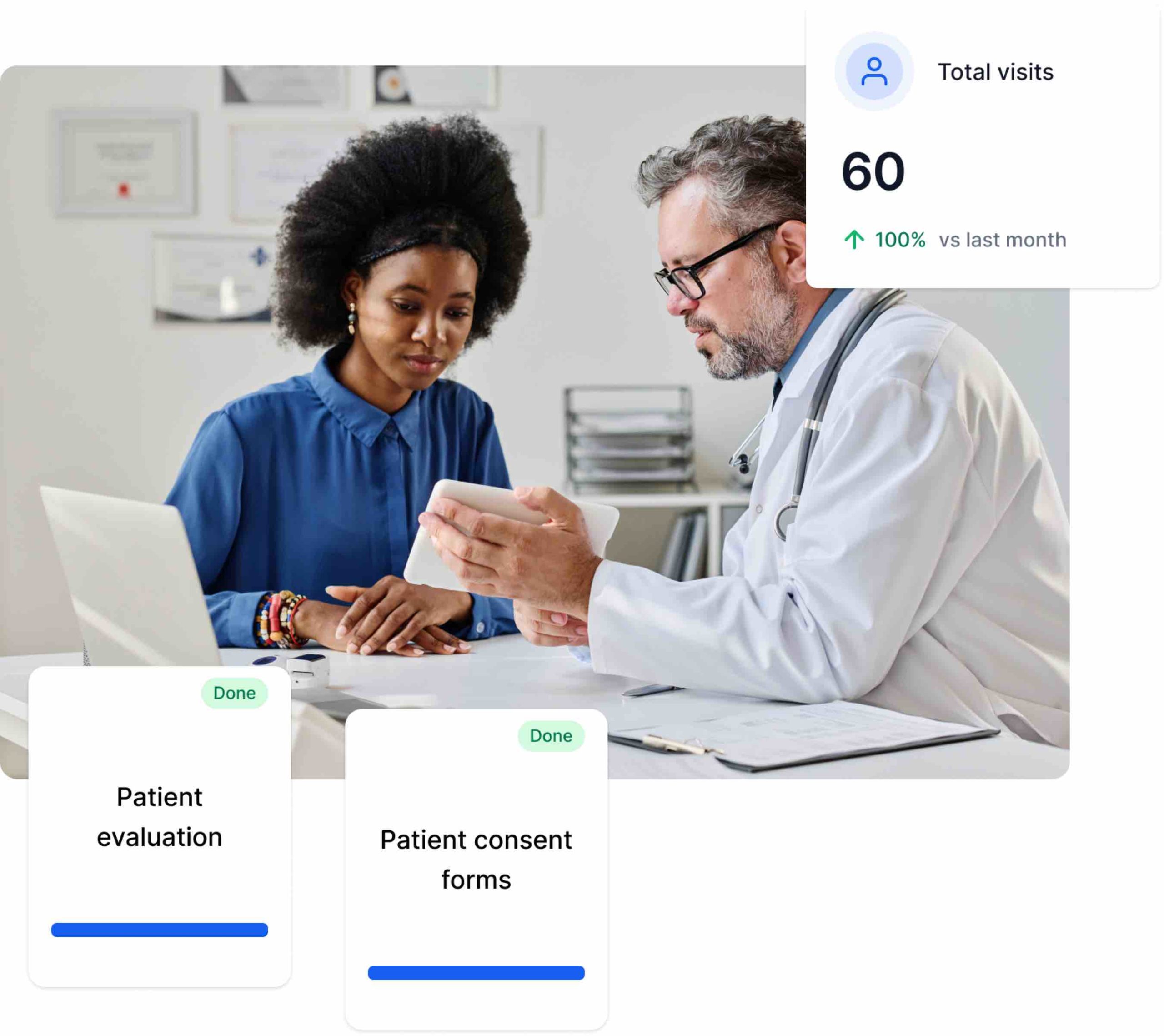
Patient engagement EMR Software FAQs
Everything you need to know about the ambula product
Ambula Patient engagement software is a game-changer for medical practices. It offers many benefits that improve patient experience and streamline administrative tasks. Medical practices can enhance patient engagement and satisfaction with features like patient portals, appointment reminders, and secure messaging. Patients can conveniently access their health records, communicate with their healthcare organizations, and actively participate in their care journey. This leads to improved patient-provider relationships, reduced no-shows, better care coordination, and increased operational efficiency for medical practices.
Patient satisfaction is a top priority for healthcare organizations, and Ambula patient engagement software plays a vital role in achieving that goal. By providing patients with easy access to their medical information, educational resources, and interactive tools, the software empowers patients to take an active role in managing their health. This level of engagement enhances patient satisfaction by fostering a sense of control, involvement, and personalized care. Patients appreciate the convenience of features like patient dashboards, appointment reminders, and secure messaging, as they enable timely communication and convenient access to care, leading to improved patient satisfaction.
Patient engagement software vendors are dedicated to helping healthcare organizations make the most of their software investments. They provide comprehensive patient engagement solutions tailored to the unique needs of healthcare practices. Vendors offer support during the implementation process, ensuring a smooth transition and integration into existing workflows. They also provide training and ongoing technical assistance to ensure that healthcare organizations and staff can effectively utilize the software’s features. Moreover, vendors collaborate with healthcare organizations to customize the software according to their specific requirements, enabling them to optimize patient engagement, improve outcomes, and streamline practice operations.
They are a vital component of patient engagement software, acting as a secure gateway for patients to access their health-related information and engage with their healthcare providers. A patient portal provides a centralized platform to view medical records, test results, and medication information. They also allow patients to schedule appointments, request prescription refills, and securely communicate with their care team. A patient portal empowers more patients to take control of their healthcare, actively participate in decision-making, and access resources that promote self-care and health management.
- Patient engagement software can significantly contribute to practice marketing efforts. By leveraging the software’s features, practices can enhance their online reputation, attract new patients, and differentiate themselves in the market. Here’s how:
- Online reviews and testimonials: Patient engagement software often includes features that allow patients to leave reviews and testimonials. Encourage satisfied patients to share their positive experiences and showcase these reviews on your practice’s website or social media platforms. Positive reviews can influence prospective patients and build trust in your practice.
- Social media integration: Integrate the software with your practice’s social media accounts to share educational resources, updates, and patient success stories. This helps to engage your online audience and promote your practice’s expertise and patient-centric approach.
- Referral programs: Implement a referral program within the patient engagement software, offering incentives to patients who refer new patients to your practice. This encourages your existing patients to advocate for your practice and helps expand your patient base.
- Seamless online appointment scheduling: Ensure your patient engagement software includes a user-friendly and intuitive online appointment scheduling feature. This allows prospective patients to find and book appointments, improving accessibility and convenience easily. A smooth and seamless scheduling process can attract new patients and leave a positive impression on your practice.
Patient engagement software improves patient outcomes by fostering active patient involvement in their care. Patients can access information and support through educational resources, interactive tools, and secure communication channels to make informed decisions and adhere to their treatment plans. The software facilitates shared decision-making between patients and healthcare providers, leading to personalized care plans and enhanced treatment adherence. Patients can better manage their health conditions with improved communication and collaboration, leading to better outcomes, increased patient satisfaction, and improved overall health management.
Absolutely! Ambula Patient engagement software often includes automated medical appointment reminder features, which can significantly benefit patients and health care providers. These reminders can be sent through various communication channels, such as email, text messages, or notifications through the patient portal. Automated appointment reminders help reduce the likelihood of missed appointments by serving as convenient and timely reminders for patients. By automating these reminders, health care providers can optimize their scheduling, minimize no-shows, and ensure efficient use of their resources, leading to improved patient access to care and better practice efficiency.
Ambula serves as a powerful tool for facilitating effective patient-provider communication. Patients can communicate with their healthcare organization conveniently and securely through secure messaging platforms, virtual visits, and patient portals leveraging HIPAA complaint integrations. These communication channels offer a more accessible and efficient way for patients to reach out to their care team and receive timely responses.
Patients can use secure messaging to ask questions, request prescription refills, share updates about their health, and seek guidance on their treatment plans. Healthcare providers, in turn, can respond promptly, address patient concerns, and provide necessary guidance and support. This improved communication enhances the patient experience and strengthens the patient-provider relationship, leading to better care coordination and improved health outcomes.
Driving patient engagement is a collaborative effort between healthcare organizations and patient engagement software. Here are some effective strategies for maximizing patient engagement through software:
a. Promote patient portals: Encourage patients to create accounts and access their health information regularly through the patient portal. Highlight the benefits of easy access to medical records, lab results, and medication information.
b. Provide educational resources: Utilize the software’s capabilities to offer educational materials tailored to patients’ conditions or treatments. This empowers patients with knowledge and fosters engagement in their own healthcare journey.
d. Implement appointment reminders: Leverage the software’s automated appointment reminder feature to reduce no-shows. Remind patients of upcoming appointments through emails, text messages, or notifications, ensuring they stay engaged and arrive on time.
e. Actively seek patient feedback: Use the software to gather patient feedback through surveys or satisfaction questionnaires. Analyze the data to identify areas for improvement and address any concerns promptly. Engaging patients show that their opinions are valued and help build trust.
f. Gamify the patient experience: Utilize gamification techniques within the software to make the patient experience more interactive and enjoyable. For example, award badges or points for achieving health goals, completing educational modules, or maintaining medication adherence.
Ambula Patient engagement software takes data security and privacy regulations seriously. Reputable software vendors ensure that their platforms comply with industry-standard security measures and adhere to relevant privacy regulations, such as HIPAA (Health Insurance Portability and Accountability Act) in the United States. This includes encryption protocols, secure user authentication, regular data backups, and strict access controls. By implementing these security measures, patient engagement software helps protect patient information and maintain the confidentiality of personal health data.
It’s important to note that while the software itself may be secure, healthcare organizations and staff must also follow proper security protocols, such as safeguarding login credentials, maintaining strong passwords, and using secure networks when accessing patient information. By combining robust software security measures with responsible data handling practices, patient engagement software ensures the privacy and security of patient data.
